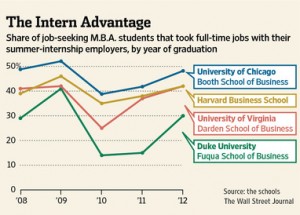http://online.wsj.com/article/SB10001424127887324423904578525431344927240.html
More Industries Pick From the Summer Talent, Raising the Stakes
By MELISSA KORN
Internship season is under way, and unless business students are already spending the summer with their dream employer, a full-time offer may be out of reach.
Banks and consulting firms have long funneled interns into full-time roles, but companies in other industries are increasingly turning to summer M.B.A. talent when they’re ready to make permanent hires, with some locking in candidates nearly a year ahead of their start date.
At many schools, it isn’t uncommon for one-third to a half of M.B.A. students to work for their summer employer after graduation, and administrators say that figure—which had dipped during the recession—is still on the rise. The trend suggests optimism on employers’ parts, but it also raises the stakes for students, who begin the summer recruiting process almost as soon as they arrive on campus.
“It puts a lot of pressure on first-years to make an early decision that could affect the next three to five years,” says Jack Oakes, assistant dean for career development at University of Virginia’s Darden School of Business.
More than 40% of students from Darden’s 2012 M.B.A. class took full-time jobs with their summer-internship employers, up from 25% in 2010. Data for the latest class aren’t yet available.

At Columbia Business School, 31% of the M.B.A.s who graduated in 2012 took full-time jobs with their summer employers, and Regina Resnick, associate dean and managing director of the career management center, says this year could go even higher. In 2010, fewer than one in five Columbia M.B.A. students landed jobs that way, according to a school report.
Offering employment a year in advance to students at the conclusion of their internships suggests firms are upbeat about their long-term hiring needs, says Ms. Resnick. At the same time, she adds, it cuts risk by allowing companies to get a preview before they commit for the long haul.
Paul King, corporate director of talent acquisition at Caesars Entertainment Corp., likens the internship to a “try before you buy” approach.
The casino operator selects 10 to 15 M.B.A. students for its corporate internship program annually, and while Caesars returns to campus for additional recruiting each fall, it doesn’t have room for many new faces: Five of this year’s six full-time M.B.A. hires had been summer interns.
Companies report that 69% of summer interns who applied for full-time positions received offers, according to a recent survey from the Graduate Management Admission Council, with even higher conversion rates in consulting, finance and accounting.
It has always been tough for students to land full-time positions at finance firms without having spent a summer there. Scott Rostan, founder of Training the Street Inc., which provides financial-training courses for new Wall Street employees, says many of his clients fill 80% to 90% of their full-time classes with interns from the previous summer.
At consulting firms, the window for non-interns isn’t much wider.
Up to 40% of the 400 full-time M.B.A.s that Bain & Co.’s U.S. operation hires each year are former summer associates, according to Russ Hagey, world-wide chief talent officer. Another third of campus recruits worked at the firm before attending business school, leaving just under one-third of the slots for students without prior experience at Bain.
Technology firms and startups are beginning to follow suit, as recruiters compete with bigger companies for talent.
At Enova International Inc., a Chicago-based online lender that started its summer internship program in 2009, the internship is a “working interview,” says Sarah Doll, senior director of talent management.
Enova had 18 interns last summer, with five now returning for full-time positions, mainly in its analytics department. Ms. Doll says she expects the company to hire a larger share of this summer’s crop of 24 interns.
Even students who don’t plan on returning to their internship employers still may need that offer in hand.
Karthik Ramachandran, a recent graduate of Columbia Business School, interned at Booz & Co. last summer but aspired to a full-time job at a larger consulting firm. Having an offer from Booz made him a more attractive applicant, he says, as it indicated he had already been vetted by another reputable source.
Mr. Ramachandran, 32 years old, says that classmates who hadn’t secured offers from their summer employers rarely made it past the first round of interviews with consulting firms. He has accepted a full-time offer at McKinsey & Co.
